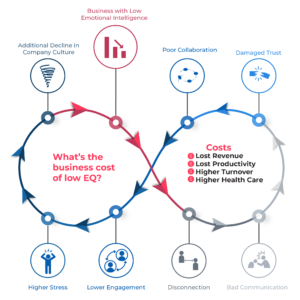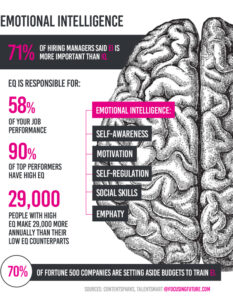In today’s fast-paced business world, where financial metrics and quarterly reports often gauge success, the absence of #EmotionalIntelligence (EI) within companies is a glaring concern. As an #EmotionalIntelligencePractitioner witnessing this widespread oversight is disheartening. Despite EI’s pivotal role in fostering resilient and thriving workplaces, its neglect remains pervasive, leaving organizations vulnerable to internal strife and external challenges. This shortsighted approach jeopardizes not only immediate success but also long-term sustainability.
Here’s why:
Productivity Plummets
Roughly 90% of top achievers exhibit strong emotional intelligence, contrasting sharply with a mere 20% of underperformers who demonstrate similar traits. This stark contrast underscores a widely acknowledged truth: Emotional intelligence and soft skills are indispensable for advancing one’s career and achieving success, as affirmed by a majority of employers. When employees understand and manage their emotions effectively, they’re better equipped to handle stress, communicate openly, and collaborate harmoniously. Conversely, teams rife with conflict and emotional volatility suffer from decreased productivity and increased absenteeism.
Talent Drain
In today’s competitive job market, top talent gravitates toward companies that prioritize employee well-being and foster a supportive work environment. Studies reveal that a large portion of employees would leave their current jobs for a company that demonstrates a commitment to employee welfare. Companies that fail to nurture emotional intelligence risk losing their most valuable asset – their people – to competitors who prioritize Emotional Intelligence.
Leadership Lapses
The importance of emotional intelligence in leadership cannot be overstated. Leaders with high EI inspire trust, motivate their teams, and navigate challenges with resilience. Conversely, leaders deficient in Emotional Intelligence are prone to micromanagement, communication breakdowns, and decision-making errors. Not surprisingly, a study by Harvard Business Review found that 71% of managers believe that EI is more important than IQ and technical skills, in leadership roles.
Customer Satisfaction Suffers
Companies that neglect EI not only struggle with internal dynamics but also fail to connect with their customers on a meaningful level. In today’s experience-driven economy, emotional engagement is paramount. Research indicates that emotionally engaged customers are three times more likely to recommend a product or service and remain loyal over time. Without EI, companies risk alienating their customer base and losing market share.
Financial Fallout
The impact of low emotional intelligence extends to the bottom line. According to a study by TalentSmart, EQ accounts for 58% of job performance and is the single biggest predictor of success in the workplace. Conversely, companies with low EI experience higher turnover rates, increased recruitment costs, and diminished profitability. According to The American Institute of Stress, the toll of job stress on U.S. employers surpasses $300 billion every year. This hefty price tag encompasses expenses related to absenteeism, turnover, diminished productivity, and direct expenditures on medical, legal, and insurance matters.
In Conclusion
The evidence is clear – companies that fail to prioritize emotional intelligence are setting themselves up for failure. From decreased productivity and talent drain to leadership lapses and financial fallout, the repercussions of neglecting EI are dire. To thrive in today’s competitive landscape, organizations must recognize the critical role of emotional intelligence and invest in strategies to cultivate it at all levels. After all, in a world driven by human connection and empathy, EQ isn’t just a nice-to-have – it’s a business imperative. Connect with me to uncover the beautiful and impactful world of Emotional Intelligence!


